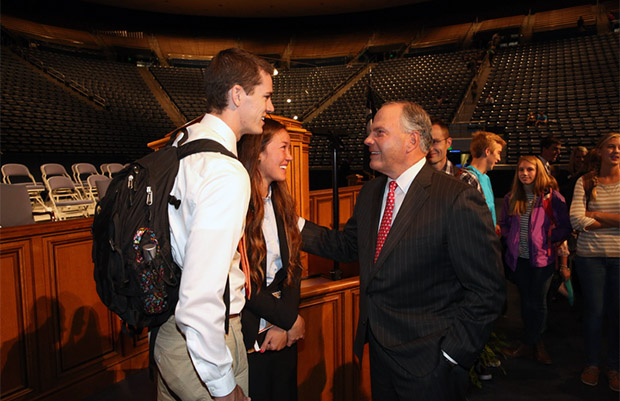Church Leader Champions “Religious Freedom and Fairness for All”
Contributed By R. Scott Lloyd, Church News staff writer

Sister Melanie Rasband reaches for the hand of her husband, Elder Ronald A. Rasband, during the singing of a hymn at BYU’s devotional September 15, 2015.
Article Highlights
- We all share a common humanity and a desire for fairness and kindness.
- Our society has become so blind by its quest to redress wrongful discrimination against one class of people that it is now in danger of creating another victimized class: people of faith.
- Church members should press forward with a “fairness for all” approach.
“We have faith that you will turn to the Savior to understand how to live a Christlike life while also showing fairness and love to others who do not share your beliefs.” —Elder Ronald A. Rasband of the Presidency of the Seventy
Related Links
In discussing and encouraging religious freedom and fairness for all, Elder Ronald A. Rasband said three principles should be observed: “See others through a lens of fairness, treat them with respect and kindness, and expect the same treatment in return.”
Elder Rasband, senior president in the Presidency of the Seventy, was the speaker at the regular Brigham Young University devotional September 15.
“I stand with the leaders of our Lord’s Church when I say that we need your generation’s natural understanding of compassion, respect, and fairness,” he said to his listeners, who mostly consisted of university students in their young adulthood.
His voice breaking with emotion, he added, “We need your optimism and your determination to work through these complex social issues.
“We have faith that you will turn to the Savior to understand how to live a Christlike life while also showing fairness and love to others who do not share your beliefs. We know you want to be a part of something meaningful, and we know that you are resilient and collaborative.”
Earlier in his talk, Elder Rasband presented two hypothetical stories to illustrate ”what we are talking about when we refer to religious freedom“ and invited his listeners to think about how they would feel if they were one of those individuals.
In the first story, a man he called Ethan had recently started his first job in a career he longed for. He was showing dedication and doing excellent work when, one day at lunch, he felt comfortable enough with coworkers to tell them he is gay.
He was disappointed by their cold response, and things became increasingly awkward at work to the point his productivity flagged and he was fired for not keeping up, knowing in his heart he was fired for being gay.
In the second story, a young woman named Samantha had just started work in a university administrative office. One day, a coworker approached Samantha and said she had heard that Samantha was a Mormon. Samantha cheerfully responded that she was but was brought up short by the question, “So why do you hate gays?”
Surprised by the question, Samantha tried to explain her belief in God’s plan for His children, which she believes included guidelines on moral and sexual behavior. Her coworker countered that the rest of society had progressed beyond those beliefs and added that “history is full of people using religious teachings to wage wars and marginalize vulnerable groups.”
The coworker told other employees about the conversation, causing Samantha to feel increasingly isolated as more questions and attacks followed. At length, her boss, seeing the increase in religious conversations in the workplace, cautioned her against proselytizing in a work environment or her job would be in jeopardy. Her work, like Ethan’s, began to suffer, and rather than risk being fired, she began to look for another job.
“There are many Samanthas and Ethans,” Elder Rasband remarked. “However we choose to live and whatever choices we make, we all share a common humanity and a desire for fairness and kindness. Ethan should not have been fired for being gay, and Samantha should not have been intimidated for being religious. Both were wrongly criticized, judged, and retaliated against.”
Elder Rasband pointed out that in today’s society it is politically correct to empathize with Ethan’s situation but less so with Samantha’s.
“Our society has become so blind by its quest to redress wrongful discrimination against one class of people that it is now in danger of creating another victimized class: people of faith like you and me,” he said.
He noted that already some religious schools are being questioned because they require students and faculty to adhere to an honor code that requires fidelity and chastity. “CEOs of large companies have been marginalized or forced to resign because their personal religious views are no longer politically acceptable. Some businesses have been forced to close because their owners have spoken their conscience.”
As an example of a “fairness for all” approach, Elder Rasband cited the Church leaders’ support of and acclaim for a recent legislative initiative in Utah that protects the rights of both LGBT citizens and religious people. Utah and the Church received national news coverage and praise for the compromise.
“Now note: no doctrinal or religious principles were sacrificed,” he said. “No changes were made to God’s moral law and our belief that sexual relations should only occur within marriage between a man and a woman. The outcome was fair to all and reflects a consistency in moral standards and teachings and in respect for others.”

Elder Ronald A. Rasband visits with students after he spoke during a devotional at BYU on September 15, 2015. Photo by Mark A. Philbrick.

Elder Ronald A. Rasband visits with students after he spoke during a devotional at BYU on September 15, 2015. Photo by Mark A. Philbrick.

A musical selection is performed during BYU’s devotional service on September 15, 2015. Photo by Mark A. Philbrick.
